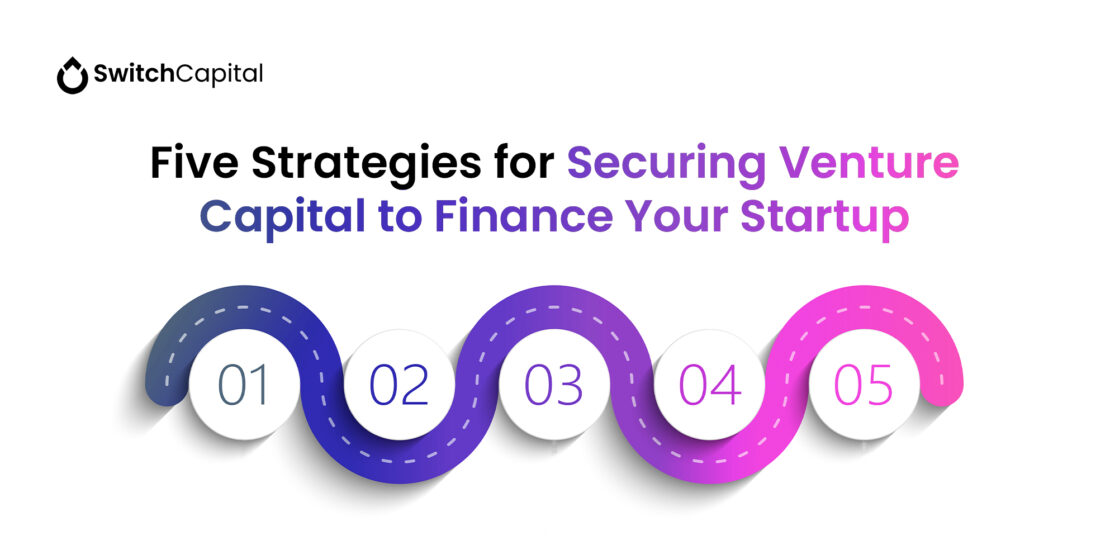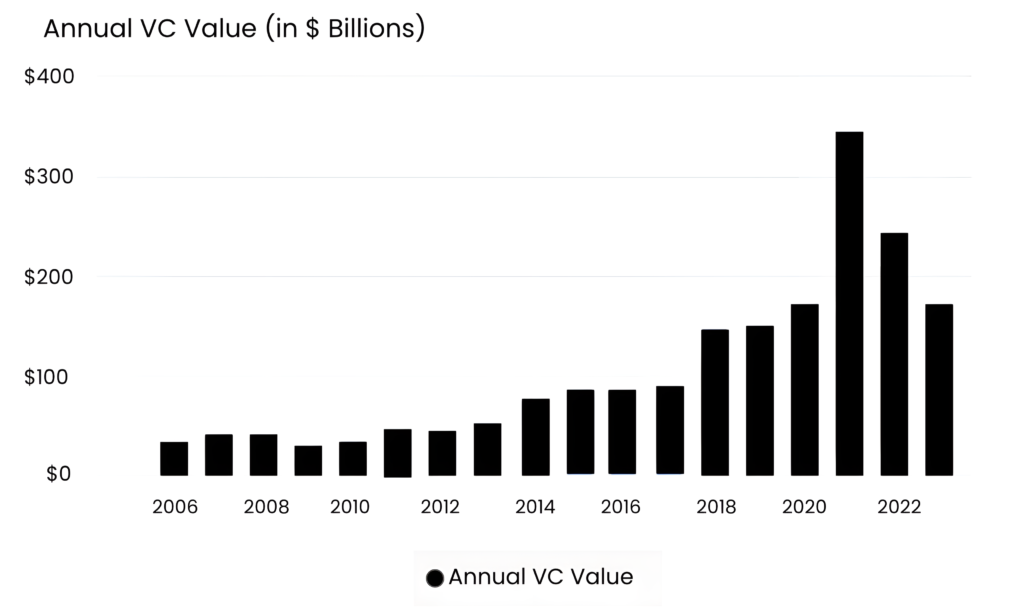Five Strategies for Securing Venture Capital to Finance Your Startup
October 18, 2024 | by Tomiwa Aghedo

Acquiring funding represents one of the greatest hurdles for startups. In addition to developing your product, hiring talent, and bringing your business to market, locating the right venture capital (VC) to drive your growth is crucial. While venture capital is a popular financing choice for many startups, the process of obtaining it can often be complex and daunting.

If you’re exploring how to connect with venture capital or engage with VC investors, you’re not alone. Many entrepreneurs face challenges in identifying the right investors, but with an effective strategy, the journey can become much simpler. In this guide, we will outline five effective techniques to help you identify suitable VC investors and secure the funding essential for your startup’s success.
Whether you’re at the initial stages of your venture or actively pursuing investment, this article offers practical advice to enhance your chances of achieving your funding goals.
Understanding Venture Capital-Backed Companies
Not every business is suited for venture capital. VC investors generally seek startups capable of rapid growth in large markets and those that can deliver substantial returns. This is primarily because venture capitalists are accountable for generating strong financial outcomes for their limited partners (LPs) through high-risk, potentially high-reward investments.
If your startup operates in a niche market or lacks a clear path to significant exits, pursuing venture capital may not be the best option for you. VCs typically gravitate towards sectors such as technology, healthcare, and fintech, where scalability is integral to the business model and prospects for large exits are apparent.
Before dedicating time and energy to securing VC funding, it’s essential to determine if your startup’s aspirations and growth potential align with the expectations of venture capital investors.
Difference Between Venture Capital and Angel Investment
Another funding option to consider is angel investment. Although both involve equity investments, angel investors face less pressure to deliver extraordinary returns compared to venture capital funds.
As noted by Investopedia, “An angel investor is an affluent individual who provides financial support for startups or entrepreneurs, typically in exchange for ownership equity in the company. Often, these investors are found among an entrepreneur’s family and friends. Angel investment may be a one-time infusion to launch a business or ongoing support during critical early stages.”
Strategies for Finding Venture Capital
Securing venture capital requires a well-rounded approach. There are various avenues to connect with potential investors, each offering unique advantages. Below are five tried-and-true strategies to help you locate the right venture capitalists for your startup, from leveraging online platforms to engaging in face-to-face networking.
- Online Platforms and Investor Databases
If you determine that venture capital suits your startup, developing a strategy to identify and connect with the right investors is essential. Research shows that founders typically engage with 50-100 investors during a fundraising campaign. To maximize your efforts, it’s crucial to have a clear understanding of the type of investor you’re seeking. Utilizing resources like investor databases can help in creating a focused list and facilitate introductions. - Venture Capital Associations
Joining venture capital associations can help familiarize yourself with the ecosystem and connect with potential investors. Some notable organizations include the National Venture Capital Association (NVCA), which unites the U.S. venture ecosystem, and the Small Business Administration’s Small Business Investment Company (SBIC) Program, which supports small businesses and entrepreneurs. Locally, there are several associations, such as the Private Equity and Venture Capital Association of Nigeria (PEVCA), which serves as the industry advocacy body promoting private equity and venture capital in Nigeria, and the African Private Equity and Venture Capital Association (AVCA), a pan-African industry organization that promotes and facilitates private investment across Africa. - Comprehensive Online VC Directories
Numerous online databases and lists are available to assist founders in identifying the right investors. During the fundraising process, it’s vital to target the appropriate investors. Tools like investor databases enable you to filter and locate investors based on relevant criteria. - Social Media Engagement
Many venture capitalists actively use social media platforms such as Twitter and LinkedIn. If you can’t find a warm introduction, engaging with potential investors online can provide an avenue for introductions and meetings. - Networking Opportunities
Building and nurturing relationships with investors is crucial. Attend both online and in-person events to expand your network. Sending regular updates can help investors build confidence in your business and keep your startup top-of-mind.
Building Investor Relationships Before Funding Needs Arise
While many founders concentrate on the fundraising process, proactively developing relationships with potential investors before you need capital can yield significant benefits. Early rapport can enhance your chances of securing funding when the time comes.
Stay Engaged with Regular Updates
Sending regular updates about your company’s progress is a valuable way to cultivate investor relationships. Even when you’re not actively fundraising, keeping investors informed demonstrates your dedication and progress. Monthly or quarterly updates can highlight key milestones and achievements.
Request Informal Insight
Reaching out to investors for informal advice can strengthen connections without the immediate pressure of asking for funding. Seeking input on various aspects of your business—like product development or market strategy—can foster meaningful relationships over time.
Engaging Investors Through Demo Days and Events
Inviting investors to important occasions like demo days, product launches, or industry conferences is an effective strategy for cultivating long-term relationships. These events offer investors a valuable opportunity to witness your advancements and become enthusiastic about your vision.
Following up with attendees after such events is also crucial. This not only helps maintain momentum but ensures that you stay at the forefront of investors’ minds. By keeping these lines of communication open, you increase the chances of their participation when you officially begin seeking funding.
The Importance of Early Relationship Building
Building relationships with investors before you need funding gives founders a significant advantage when the time comes to raise capital. These connections foster trust and provide key insights into what investors are looking for, which can influence your business strategy and growth.
Successful founders often attribute their efficient capital-raising efforts to early relationship building. Approaching individuals already familiar with your journey is far more effective than attempting to connect with someone cold.
Key Tips for Securing Venture Capital
As previously noted, it’s vital to focus your efforts on the right investors for a successful fundraising initiative. Here are several strategies for identifying and securing suitable investors:
- Target VC Firms That Align With Your Company
It’s crucial to pitch to investors who have a history of investing in companies similar to yours—considering factors such as industry, check size, and funding stage. Utilize tools like Visible Connect to filter potential investors effectively. - Understand Your Valuation
Since venture capitalists invest in exchange for equity, you should have a clear grasp of your business’s valuation and be prepared to discuss it during your fundraising efforts. - Match Your Needs With the Right Funding Stage
Venture capital encompasses various stages of investment. Some investors specialize in pre-seed or seed funding, while others focus exclusively on later-stage companies. To optimize your time, ensure the investors you approach align with your funding stage. For instance, if you’re raising a $1M seed round, focus on investors who typically make investments of that size rather than those who write much larger checks. - Review the Funding History of the Firm
Look into the funding history of potential VC firms. Typically, a VC raises one fund at a time, distributing it over several years. If a fund was last raised many years ago, they may be conservative with their investment criteria, as they might be nearing the end of their capital. - Consider Geographic Preferences
Some investors may only be interested in specific locations. Ensure you review their investment criteria and geographic focus before engaging them.
Common Pitfalls in Fundraising
- Over-Valuing Your Business
One common mistake is overestimating your company’s value. While seeking a high valuation is tempting, without strong justification, it can deter potential investors. An inflated valuation could hinder your ability to raise funds in the future. - Engaging Mismatched Investors
Not all VC firms are alike. Targeting the wrong investors—those who do not align with your industry, stage, or funding size—can result in wasted efforts. Conduct thorough research to ensure you’re reaching out to the right individuals. - Neglecting to Present a Clear Exit Strategy
Investors are keen on understanding their potential return. If your pitch lacks a defined exit strategy—like an acquisition or IPO—they may hesitate to invest. Be prepared to discuss possible exit scenarios during your presentations. - Lacking a Compelling Narrative
Venture capitalists receive numerous proposals. Crafting a compelling story that transcends mere numbers is essential to engage investors. Communicate not only what your company does but also why it matters and its potential impact on the market. - Only Building Relationships During Fundraising
Many founders reach out to investors only when actively seeking funding. Establishing connections before needing capital can streamline the process significantly, as cold introductions are less effective. - Inadequate Preparation for Due Diligence
Another frequent error is not being ready for due diligence once a VC shows interest. Investors will want to analyze your financials, customer data, and legal framework. If you’re disorganized in providing necessary information, it could jeopardize negotiations.
The Value of Lead Investors in VC Rounds
Finding a lead investor is crucial for closing a venture capital round. This primary investor typically contributes a significant share of the funding and helps shape the deal terms, which other investors often follow.
Role and Importance of the Lead Investor
The lead investor not only commits a substantial portion of the funding but sets crucial deal terms, including valuation and equity distribution. Their endorsement can enhance your startup’s credibility and appeal to additional investors.
When seeking a lead investor, choose someone who understands your market and aligns with your vision. Their engagement can bring more than just financial support; they can also provide valuable mentorship and connections.
Securing a Lead Investor
To successfully secure a lead investor, it’s essential to establish a strong relationship from the outset. Lead investors need to have confidence in your team, your product, and the potential of the market. They typically look for clear indicators of growth and traction before they are willing to take the lead in your funding round. As previously mentioned, nurturing these relationships through regular updates and informal discussions can simplify the process when you decide to seek capital.
The Impact of Having a Strong Lead Investor
Once you have a lead investor committed, the chances of successfully closing your funding round significantly improve. Other investors are likely to adhere to the lead investor’s terms, and their involvement enhances the perception of your company as a worthwhile investment opportunity. This dynamic can expedite the completion of your funding round.
Lead investors frequently become actively involved in the growth of the company after their investment, contributing to key business decisions and offering advice on subsequent fundraising efforts. Their partnership extends beyond just a short-term win for your startup; it represents a long-term alliance that can significantly influence your company’s trajectory.
Related resources:
RELATED POSTS
View all


